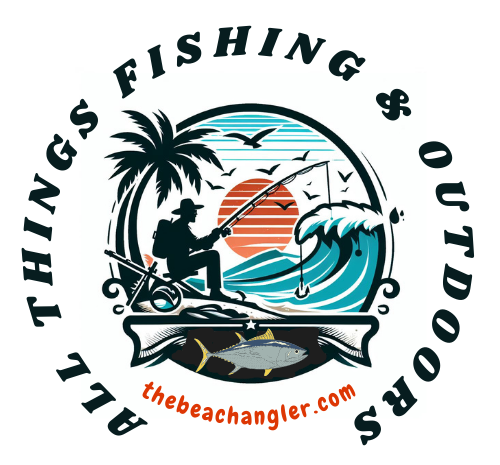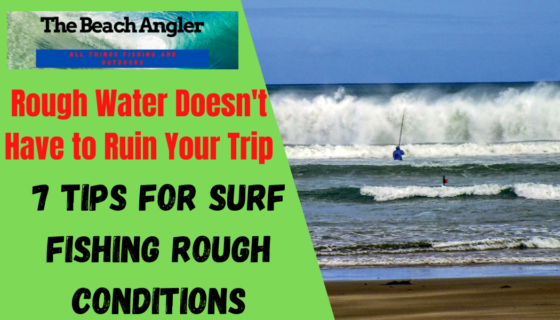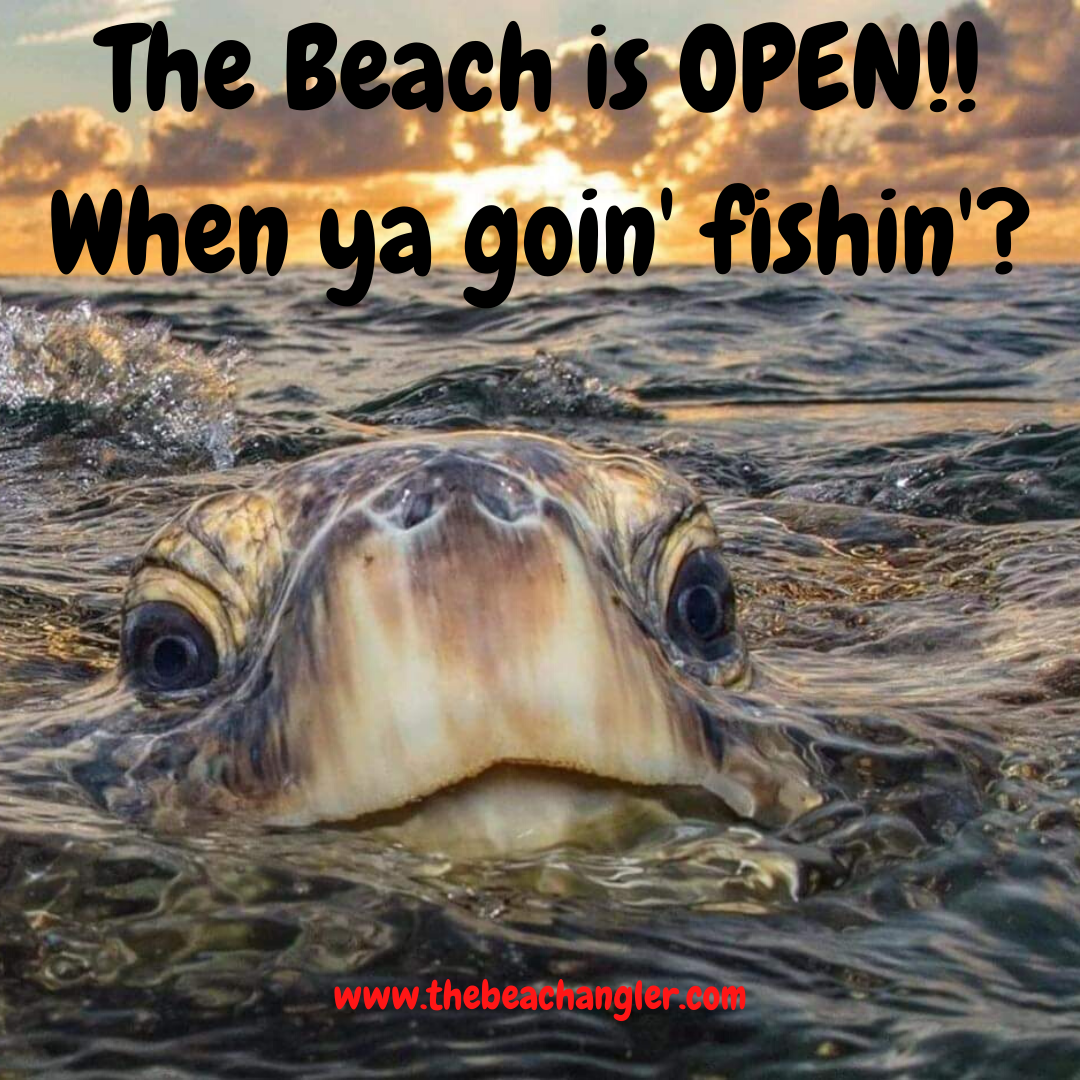If you’re like most of us, you go fishing when you can, not necessarily when the conditions are ideal. Often, in fact, we are faced with not so ideal of conditions like rough water. Depending on where in the world you fish, rough surf can mean vastly different conditions.
Along the Gulf of Mexico coasts of the US, rough surf may mean 5 -6 ft or greater seas. Other parts of the world, that may be considered mild seas. Whatever your definition is, we all have experienced rough surf that forces us to alter our plans.
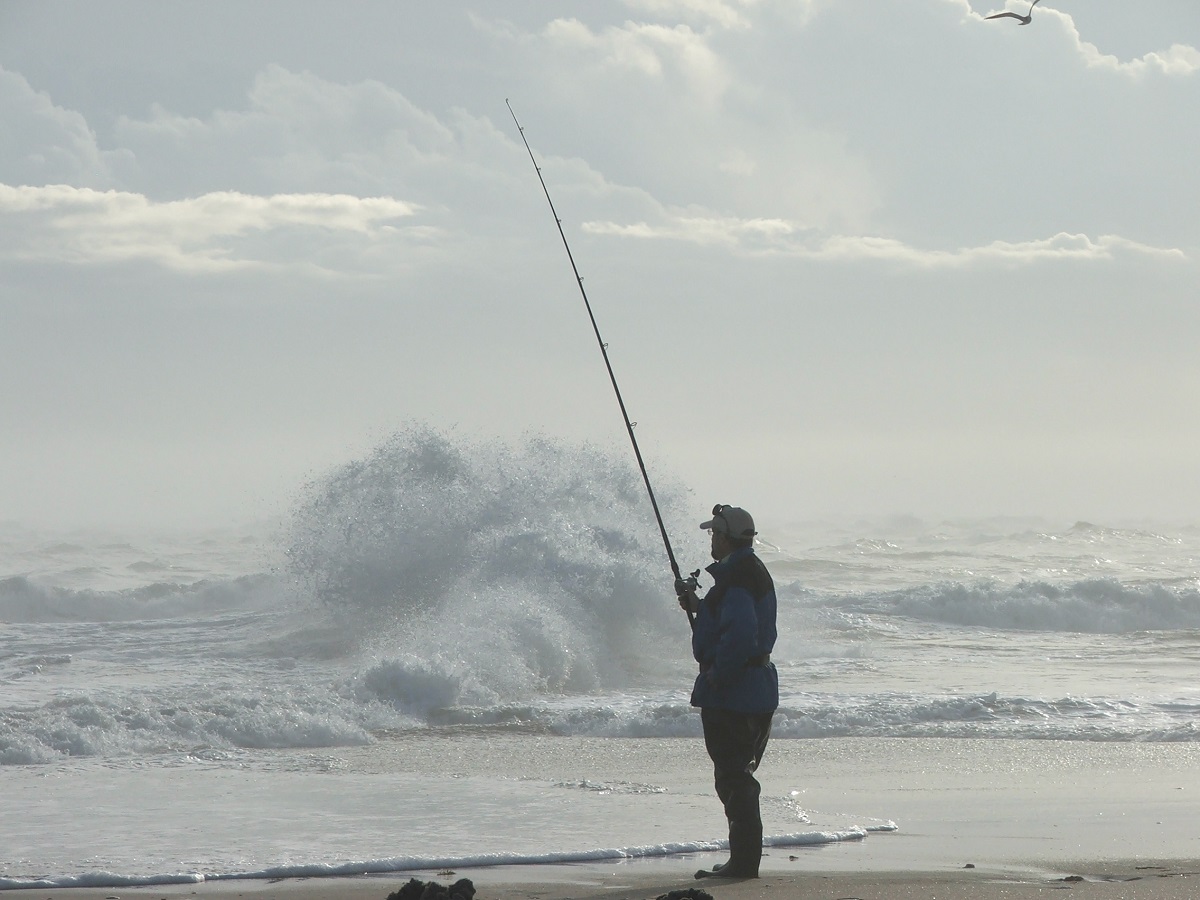
QUICK SHOT:
7 Tips for Surf Fishing Rough Water are: 1.) Always Practice safety first and wear a life jacket. 2.) Use Longer heavier action rods to cast further and keep your line above some of the wave action. 3.) Use heavier surf (spider) weights and stronger line to hold your bait in place against the waves and current. 4.) Concentrate on deep guts or troughs close to shore that you can cast to from the beach. 5.) Fish areas of points, sand bars, cuts and rips. 6.) Try to fish the higher tides as fish will tend to be working closer to the beach. 7.) Keep an eye out for bait activity in or near the water.
So, What causes rough surf? Rough surf is abnormally large waves that are most commonly caused by wind. We covered fishing in windy conditions recently and you can read about that if you want. Wind-driven waves, or surface waves, are created by the friction between wind and the surface of the water.
As wind blows across the surface of the ocean it pushes water and causes waves to form. As the wave height exceeds the water depth, the waves start to break. The larger the waves, the further off shore you will see beakers. This larger waves can affect fish and fisherman, but you can still fish in rough water, and yes, catch fish.
Beach fishing in the Surf
With More than 70 percent of the earth’s surface covered by oceans, there are about 620,000 kilometers (372,000 miles) of coastline. Over one-third of the total human population, nearly 2.4 billion people, live within 100 km (60 miles) of an oceanic coast.
Millions of people flock to the beach every year for vacation and fun in the sun. But, there is also some great fishing opportunities where the waves meet the sand.
Wherever you find a beach, there will be fish. All kinds of fish. Everything from perch to Sharks and with the right equipment and a little bit of knowledge, you can catch them. The available species will vary by region and ocean.
Some of the worlds beaches are leeward of the prevailing winds and are relatively calm, while others experience large waves on a daily basis. And, even the calmest area, on occasion, can develop rough surf conditions that make fishing from the beach more challenging.
Now, just because the weatherman and surf conditions aren’t perfect is no reason to give up your fishing plans. There are still fish in rough surf and you can still catch them.
It may take some changing up of your normal techniques and gear, but that is what makes it fun and challenging. Let’s take a look at how to approach surf fishing in rough water conditions.
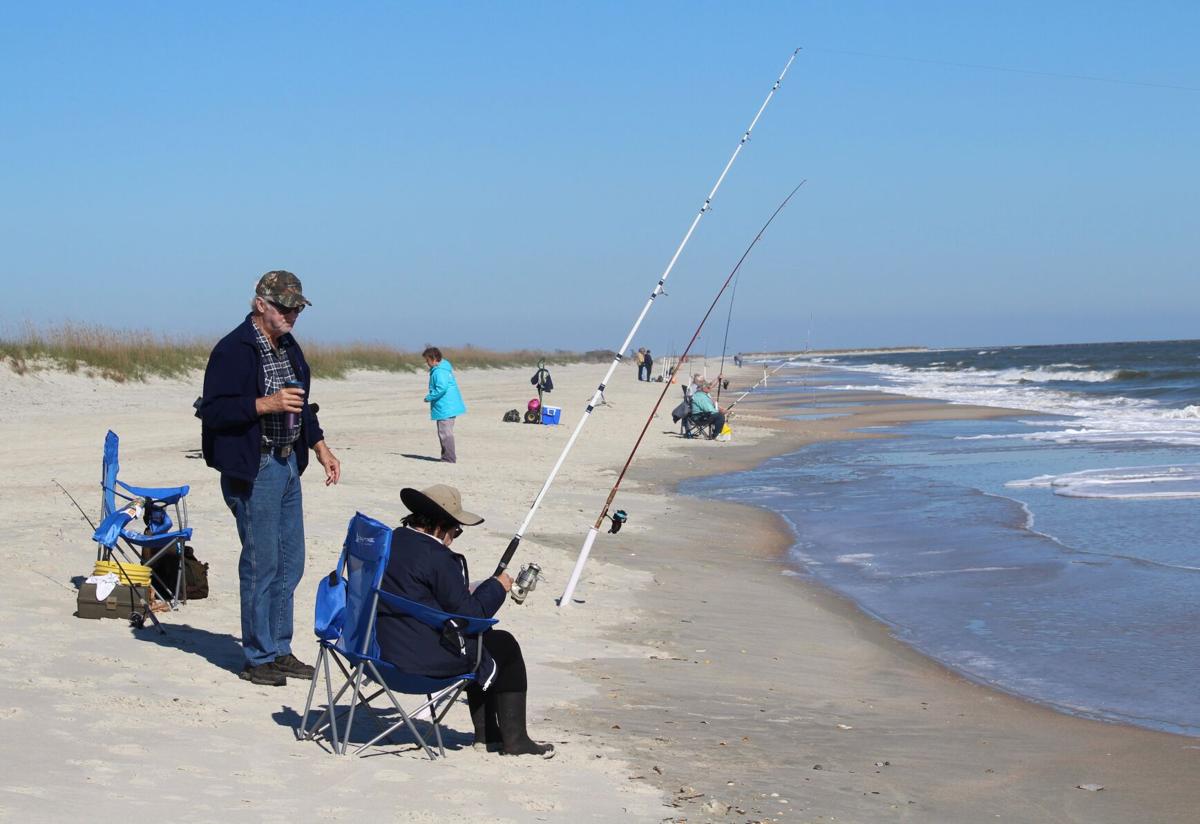
Essential Surf Fishing Gear:
- Surf Fishing Rods, surf rods are typically longer and heavier duty than standard rods. – read more.
- Surf fishing Reels,larger and stronger with greater line capacity to handle big fish. – read more.
- Surf fishing Rod and Reel Combos, pre-matched rod and reel set ups for surf fishing – read more.
- Sand Spike Rod holder, holds your rods securely while you wait for that big bite. – read more.
- Surf Fishing Rigs, terminal tackle for fishing the surf. – read more.
- Surf fishing Carts, for beaches that won’t allow vehicles you need a way to carry your gear – read more.
- Rod Racks for Vehicles, carry your rods out of harms way and easy to access- read more.
- Beach Camping Gear, in case you want to fish all night or for several days – read more.
Surf Fishing in Rough Water Conditions
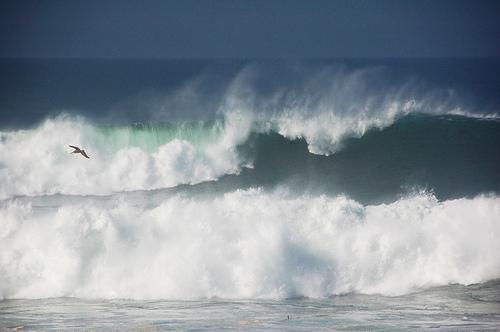
Surf Fishing in rough water conditions means big waves that make it difficult, dangerous, or near impossible to wade fish the surf zone.
Some areas that is just a normal occurrence and fishermen have learned to adapt, improvise and keep fishing.
What is it that causes rough surf? When we talk of rough surf conditions, it’s waves driven mostly by wind.
Wind-driven waves, or surface waves, are created by the friction between wind and the water’s surface. As wind blows across the surface of the ocean or a lake, swells are produced. The more wind, and the longer the duration of the wind, the larger the swells. As these swells are pushed on to shore, they form the waves that make the surf. Storms at sea can produce waves that travel hundreds of miles.
But, do waves affect surf fishing, and if so, how? More wave action tends to stir up the sand and sediment creating murkier water conditions.
As a consequence, it also increases currents and can expose crabs, clams and other crustaceans to hungry predators. Small bait fish are pushed around by the currents and choppy seas making them easier prey.
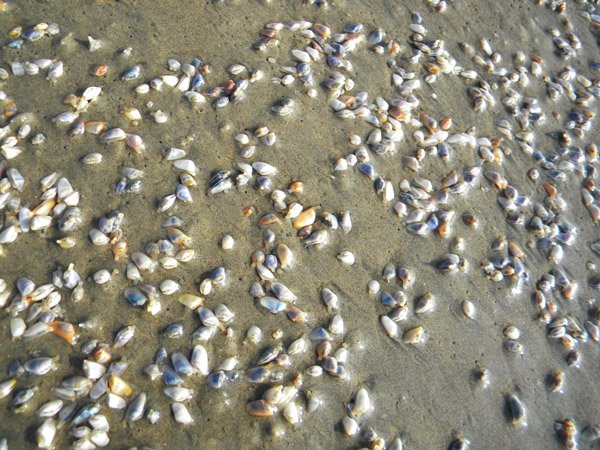
The murky waters give predators more opportunity to ambush bait. In a previous article we discussed surf fishing and the effects of windy conditions on currents, and rough surf conditions will produce strong currents as well.
Choppy and murky waters are less conducive to fishing with artificials, you will need to throw bigger and heavier baits to battle the waves and currents and noisier baits can help draw strikes. Rough surf conditions may mean changing your target species. Game fish that prefer sight feeding in clear waters will be harder to find in the murky conditions that frequently accompany rough surf.
So, is surf fishing good in a rough surf? It can be great, if you are willing to adapt your tactics and target species. Part of the fun of fishing, after all, is finding out what works for a particular set of conditions. One of the many reasons it’s called fishing instead of catching. 😉
Can You Catch Fish in Rough Seas?
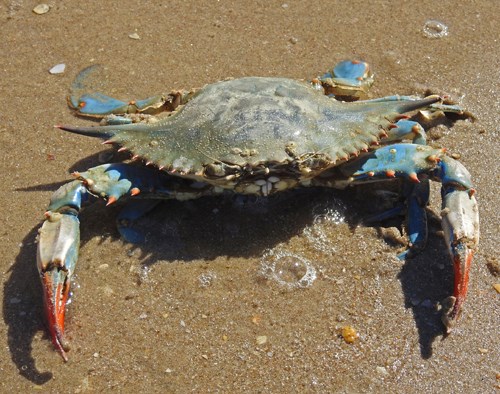
I know fishing is much more fun when there is some catching involved So, that brings up the obvious question, can you catch fish in rough sea? Absolutely! You can catch a lot of fish in a rough water surf.
In fact, some game fish species seem to prefer rougher murkier water. Particularly those that feed on crabs clams and other crustaceans that are dislodged by the rough waters and strong currents.
Along the Texas Gulf Coast, redfish, black drum, whiting and various shark species all can be caught in rough surf conditions. Every beach in the world will have similar fish if you will target them, you can catch them. As to the question “is fishing in choppy water good?” The answer is yes, if you are willing to adapt and take what mother ocean gives you. It may not be ideal conditions for the way you wanted to, or were planning on fishing, but you can still catch fish and have a good trip.
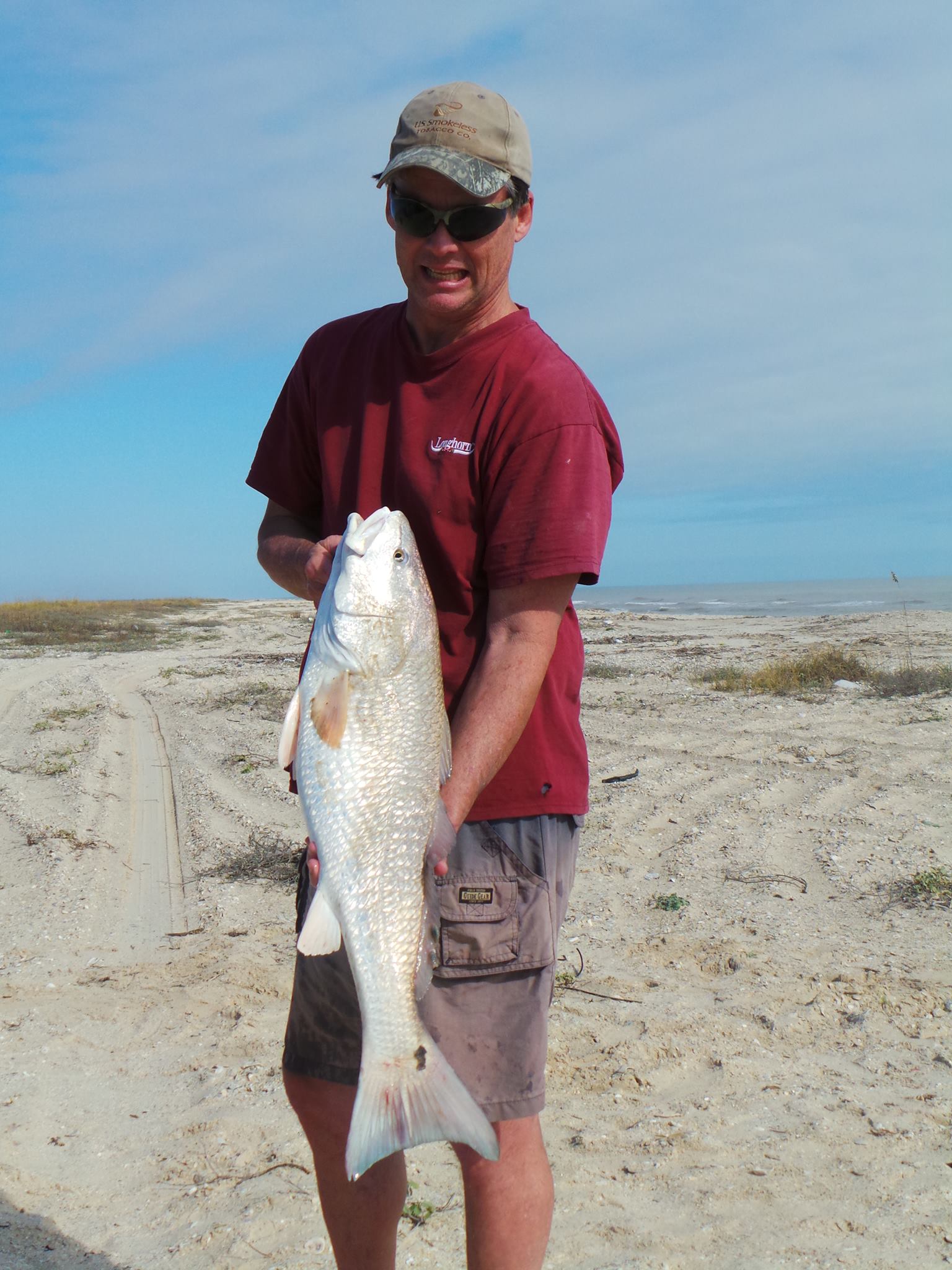
Now, with all that being said, “Just how do you surf fish with big waves?” And, “Do waves affect surf fishing?” Fishing in rough water surf conditions will take some changes in gear and tactics. And, it will be even more important to practice safety with the stronger currents and rips that rough seas produce.
If you find yourself planning a surf fishing trip and the surf conditions are going to be rough, here are some tips for fishing in a rough water surf that will help you have a safe and successful fishing trip.
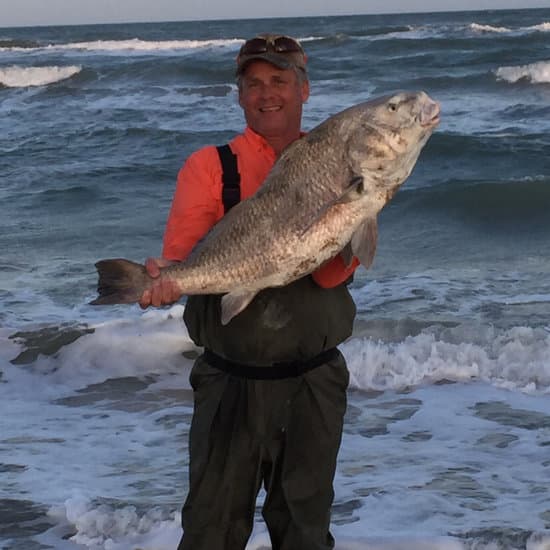
Tips for Fishing in Rough Surf
1. Always, Safety First – I preach this a lot, I know, but there is no fish in the ocean worth losing your life over. Rough surf conditions bring large waves and strong currents. In just an instant you can be knocked off your feet and swept out to sea.
If you are going to in or near the water, wear a life jacket (PFD) and always fish with friends. Fishing alone and without a PFD, in rough surf, is a recipe for disaster. They make fishing vests that double as a PFD.
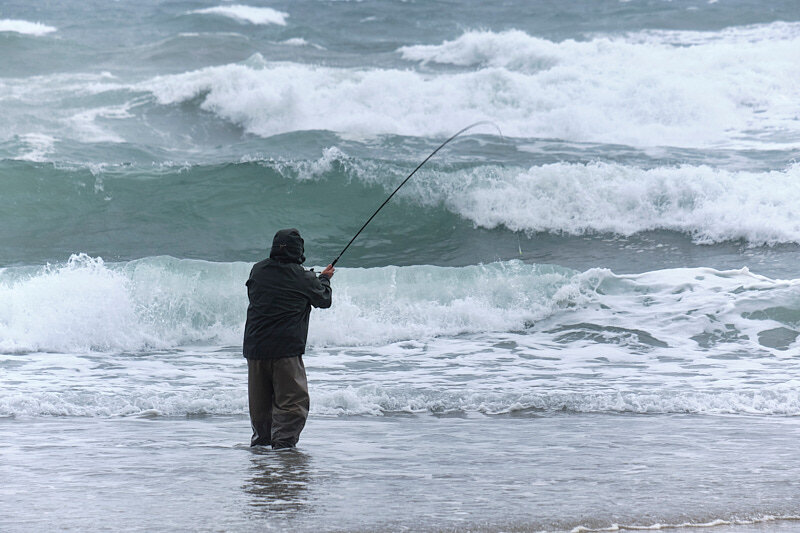
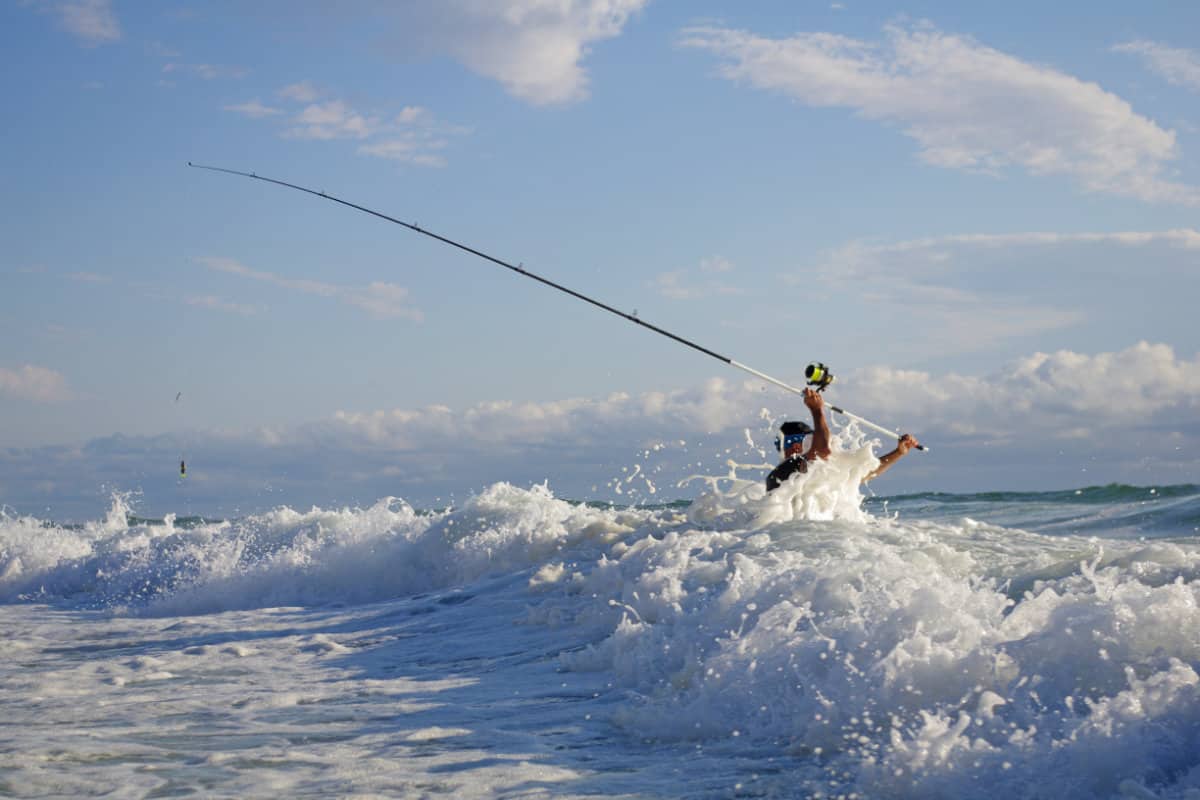
2. Use Longer heavier action rods – Fishing rough surf requires heavier duty gear including longer rods and bigger reels with a heavier line to match the conditions. Rods of 10 to 12 feet that can handle casting weights in the 2 to 6-ounce range. And a longer rod helps keep the line above breaking waves which can pull your weight loose and allow your bait to be washed down current.
You will need a larger reel balanced and matched well for your rod and with sufficient drag and line capacity for heavier lines. Braided line in the 20# to 30# range will still have a relatively small diameter that allows greater line capacity and longer casts. Smaller diameter line will create less drag from wind and waves which will also help keep your bait in place in rough surf.
3. Heavier weights, line and lures – Rough waters, in general, means heavier gear. An important surf fishing recommendation is for your line to test approximately 10 times the number of ounces you are casting. That means a 30# line is when casting rigs with a 3-ounce weight and a 60# line for throwing 6-ounce weighted rigs.
This is to keep the line from popping, should the bail trip or line tangle during the cast. Believe me, it CAN happen! You will need to alter some of your surf fishing tactics and locations to remain successful during rough conditions. For example, adding more weight to hold against stronger winds and currents, and using surf (spider) weights is your best bet.
4. Concentrate on deep guts (troughs) close to shore – Rough surf can be dangerous if you are trying to wade into the waves to make a longer cast. Look for the deeper guts close to shore that you can cast too from the beach without wading. The fish will be there, and you will stay safe and dry.
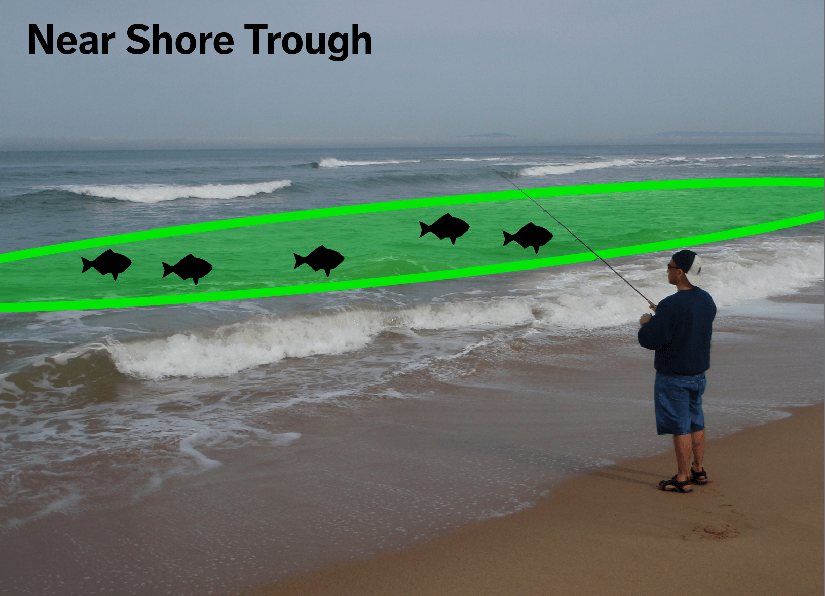
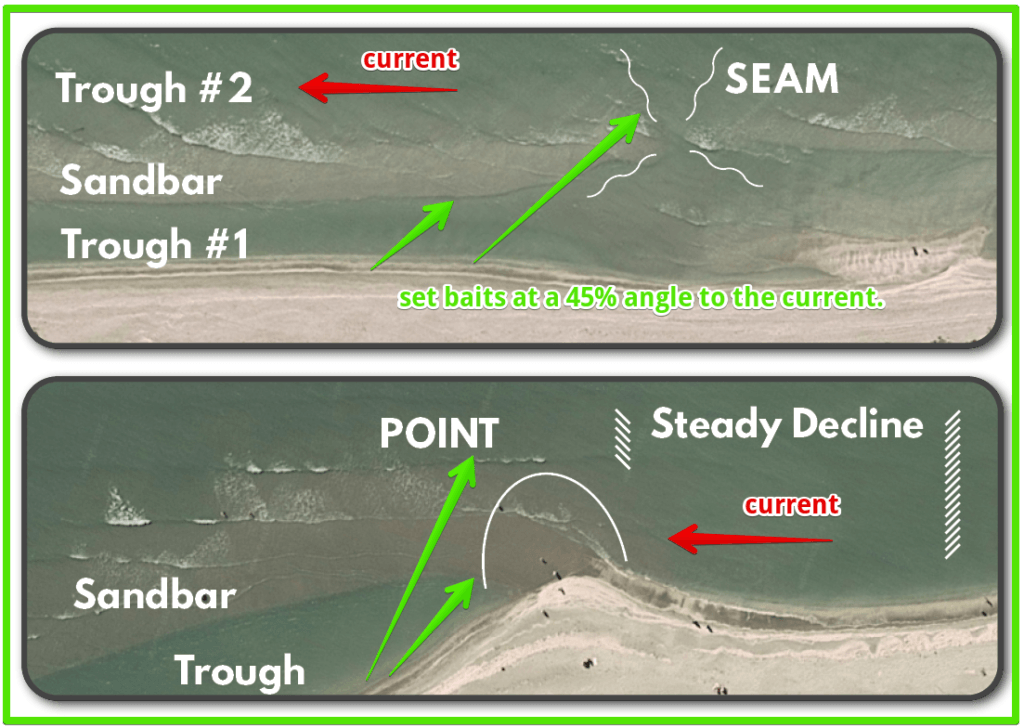
5. Use points, rips and sandbars to your advantage – When learning to how to surf fish, finding and fishing structures along the beach can be crucial to success. But circumstances do not always allow anglers to look into the water in order to determine these locations.
Minimal sunlight, rough or dingy water can obscure sandbars from direct view, and in the case of rough surf even hide them all together. But even with minimal experience, new anglers can learn how to read the beach and that will allow them to find fishable waters during these more challenging conditions.
6. Pay attention to the tides – Tidal movement is always better for fishing the surf, but in the case of rough surf conditions, fishing the high tides will have deeper water closer and easier to cast too. The bait and game fish will likely be in closer during high tide as well.
7. Watch for bait activity – As always, if you can find bait you are more likely to find fish.
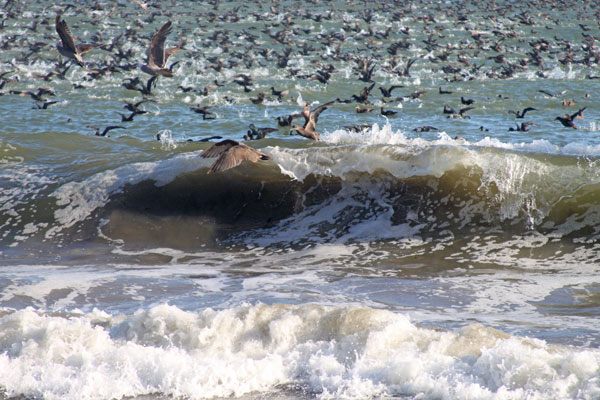
This can be as simple as seeing bait fish jumping in the surf to walking along the waters edge looking for signs of crabs, clams, ghost shrimp and other crustaceans. Combine high tide, a deep gut, a point or rip with bait activity, and you have a potential hot spot.
Put these tips to practice next time you head to the beach and find a rough surf. You can still have a great time and catch some fish. Besides, a day fishing, even in rough conditions, is better than sitting in front of the TV watching someone else fish. Adapt, improvise and overcome. 😉
Frequently Asked Questions About Fishing in Rough Surf

Is it safe to surf fish in rough water?
Surf fishing in rough water can be challenging and potentially dangerous. It’s crucial to prioritize safety, wear appropriate gear, and be aware of changing conditions.
What safety precautions should I take in rough water conditions?
Wear a life jacket, use a wading belt, and be cautious of strong currents. Avoid fishing in areas with dangerous undertows, and always keep an eye on the changing tide.
What fishing gear is recommended for surf fishing in rough water?
Choose a sturdy surf rod with a heavy power rating, a robust reel with a strong drag system, and heavy-test fishing line. This equipment helps handle the challenges of rough water.
Are there specific lures or baits that work well in rough water?
Larger and more visible lures or baits are often effective in rough water conditions. Consider using spoons, plugs, or large cut bait to attract fish.
How does rough water affect the behavior of fish?
Fish may be more active in rough water, seeking prey stirred up by the waves. Experiment with different lures and baits to see what the fish are responding to.
Can I fish in the surf during high winds and storms?
It’s generally not recommended to fish in extremely high winds or storms due to safety concerns. Monitor weather forecasts and avoid fishing in dangerous conditions.
Are there specific locations on the beach that are better for surf fishing in rough water?
Look for areas with sandbars, troughs, or other underwater structures that can provide some shelter from strong currents. These areas may attract fish seeking refuge.
How can I handle my fishing rod and reel in rough water?
Maintain a firm grip on your rod, and be prepared for strong pulls. Use a rod holder with a sand spike for added stability when fishing in challenging conditions.
What is the best bait presentation for rough water surf fishing?
Consider using heavier sinkers to keep bait in place in turbulent conditions. Adjust your rig to minimize the impact of strong currents on your bait presentation.
Are there any restrictions on fishing in rough water conditions?
Some areas may have specific regulations or advisories regarding fishing in rough water. Check with local authorities or fishery management for any restrictions.
Always prioritize safety when surf fishing in rough water, and adapt your approach based on the conditions.
Yes, You Can Still Catch Fish in Rough Surf
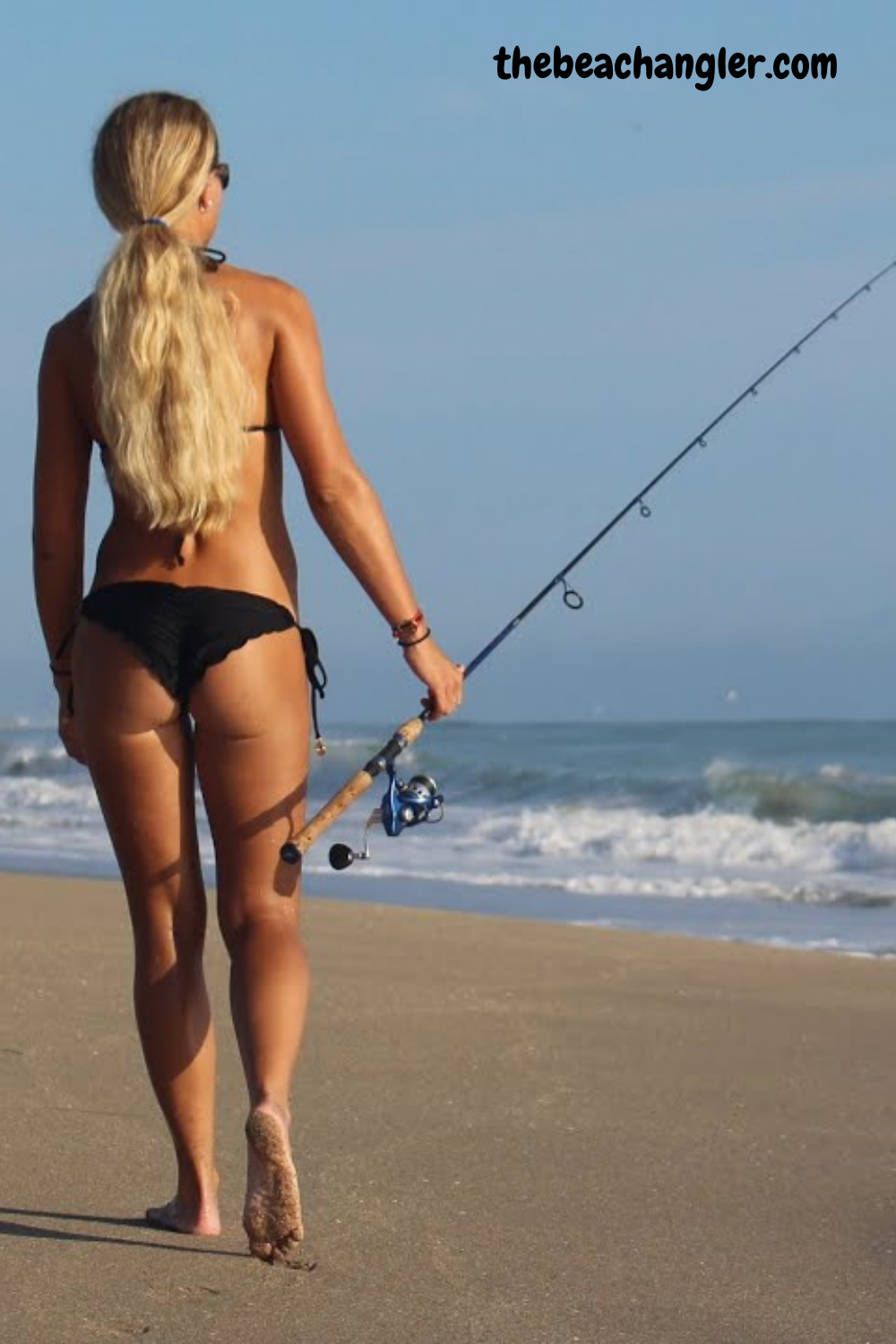
So, don’t let a little rough water spoil your trip. There are still fish there to be caught. In fact, some fish actually seem to prefer the rough water like redfish, black drum and even some sharks. Reading the beach to find those deep troughs or guts close in to the beach will be key, and concentrating on high tide will help too. You may have to modify your plans and target species, but you can still have a great time and catch some fish. After all, fishing is always good. Even when the catching, or the weather, isn’t.
As always, stay safe, enjoy the journey and please try to leave it cleaner than you found it. If you have any comments, questions, ideas or suggestions please leave them in the comment section below and I’ll get back to you asap. You can follow us on Facebook: Rex The Beach Angler, Instagram: thebeachangler7, Twitter: @AnglerBeach, and YouTube: Man Art Creations.
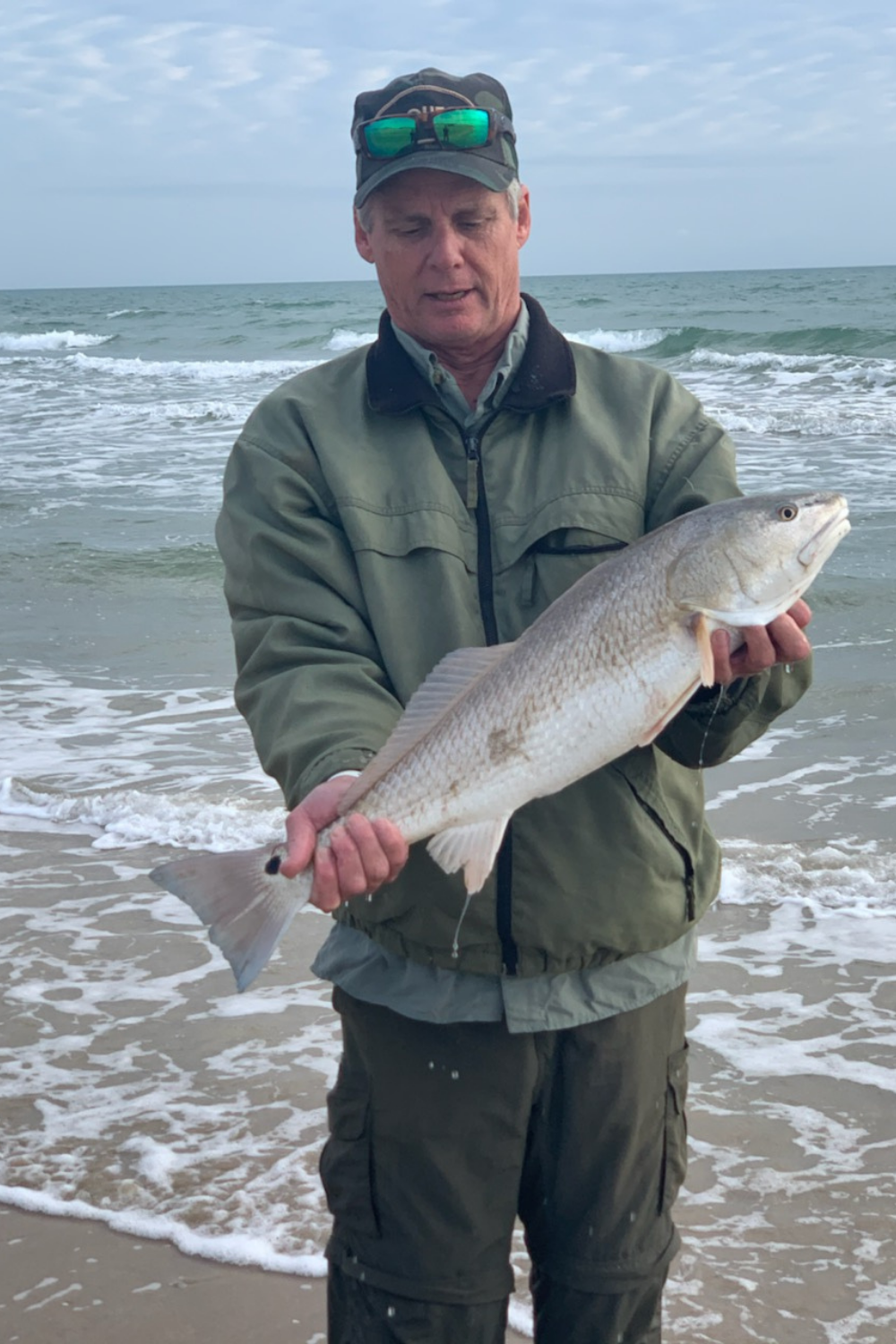
A life long surf fisherman with 50+ years of experience, I am also an avid hunter and outdoorsman. I will be sharing my passion for the outdoors with you so be prepared for hunting, fishing, camping, hiking and more. Along with gear reviews and the latest trends and innovations in the outdoor industry.
